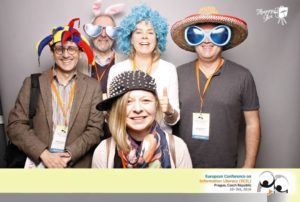Jane Secker (IL Group Chair), Stéphane Goldstein (Outreach and Advocacy Officer) and Geoff Walton (Library School Rep) reflect on their impressions of this year’s European Conference on Information Literacy (ECIL).

The 4th European Conference on Information Literacy (ECIL) took place in Prague on 10-13 October. The Czech capital was an inspired choice: an outstandingly beautiful city, full of baroque splendor, a place that in the same breath displays grandeur and intimacy. And then there were the ubiquitous dumplings and the slivovice…
Attending and presenting from the CILIP Information Literacy Group Committee were the three of us: Jane Secker, Chair of the Group; Stéphane Goldstein, Outreach and Advocacy Officer; Geoff Walton, Library School Rep; and also one of our training officers, Andy Walsh. Jane has blogged about her experiences at the conference on the work she’s been doing in copyright education. Stéphane gave a presentation on employability and, as conference rapporteur, made the final address. Andy ran a workshop where participants got to make library games, and Geoff was involved in in three papers on his recent research projects on information discernment, data literacy and IL in Vietnam. The group also sponsored a place at the conference for an Information Literacy Group member and Kirsten McCormick was delighted to attend and has also written a blog post.
Our hosts, from AKVŠ, the Association of Libraries of Czech Universities, rose to the occasion by running a rich, engrossing and well-organised event. As has become the practice with ECIL, the near 300 participants from 51 countries (including 19 attenders from the UK) took part in an ambitious programme – in all, this comprised of 180 abstracts – covering a wide range of themes, including research methods, health literacy, media literacy, teaching IL, lifelong learning, IL theory, digital literacy, media literacy and more.
The main theme of the conference was the inclusive society – an important and highly current topic that touched on major social, economic and political issues and addressed how IL can allow for playing a full part in society, as citizens, workers, learners, researchers or even patients.
In their different ways, and reflecting different perspectives, the keynotes and invited speakers delved on these challenges. Thus Tara Brabazon spoke about how, in societies characterised by immediacy and impatience, time needs to be found to allow individuals to reflect on information, in order to allow them to play a role as engaged and critical citizens. A podcast of Tara’s keynote is available. Jan Van Dijk set out a hierarchy of skills, from basic digital competencies to high level information literacy, that have to be acquired and nurtured to underpin the sort of 21st century competencies necessary to play a part – and not be left behind – in a world of rapidly evolving economic practices and working patterns. Annemaree Lloyd reminded us of the challenges faced by individuals and communities whose lives have been fractured by hugely difficult circumstances such as war, and who need to rebuild information landscapes in order to integrate into strange (and sadly, sometimes hostile) host societies.
Three strands of the conference were devoted specifically to inclusiveness, participation and democracy, with a strong focus on the role of public or school libraries. But in addition, the inclusive society theme was evident from a range of presentations and posters across the breadth of the programme. It is impossible to do justice to all that was covered, but the selected examples below give a flavour of how the key theme was addressed in different countries:
- the notion of library neutrality, and a more interventionist role for librarians in helping to address difficult issues stemming from major political crises (France);
- the attitude of trainee teachers to social inclusion (Croatia);
- the relationship between lack of access to school library programmes, including IL teaching, and social exclusion in disadvantaged neighbourhoods (USA);
- practical steps towards facilitating the integration of immigrants through library information literacy programmes (USA) or library centred intercultural activities (Czech Republic);
- the level of digital engagement of elderly people, to ensure that they remain active participants in society (Czech Republic);
- the ACRL Framework as a dynamic approach to considering issues of empowerment, social justice and inclusion in the furtherance of knowledge (USA);
- the ‘Unconference’ – the informal session that preceded the main conference – also covered issues of greater participation through crossing and expanding information boundaries and breaking out of constrained information boxes;
- last but not least, the engaging and though provoking panel session run by the CILIP Information Literacy Group, Tinder Foundation and InformAll demonstrated how public libraries work collaboratively with a range of stakeholders in local communities in order to promote digital inclusion (UK). We have made our slides available here.
An inclusive society means reaching out, and we heard much about how librarians achieve this and build relationships – often imaginatively and under pressure – in order to advance the case of IL.

But perhaps ECIL needs to do the same too. This year, as in previous years, we were privileged to take part in a multi-faceted event that covered a wide range of perspectives. However, these perspectives were presented essentially, with a few exceptions, by experts from the library or information sciences worlds. Doesn’t inclusiveness suggest a need to open up to other groups of stakeholders, albeit without losing the essential scholarly nature of the event?
In a presentation on employers’ requirements, Vjeran Bušelić, who has a background in business and ICT, stressed the importance of adapting to the language and practices of employers when seeking to demonstrate the relevance of IL to workplace settings. This implies putting ourselves in the shoes of players whose policies and practices touch on IL, but who never refer to it as such. Should ECIL draw from this point in future by involving at least a small number of speakers and participants from other stakeholder groups who could enrich the conference by providing their own perspectives? For instance, inviting the following:
- inviting elected representatives, citizens’ forums, representatives of civil society, think tanks, policymakers when looking at IL in terms of participation and democracy;
- human resources/recruitment managers, knowledge and information managers, entrepreneurs, trade union when considering IL in workplace contexts;
- healthcare professionals and patient groups when discussing health IL.
But there is a major caveat: ECIL and the IL community will only attract the interest of such groups if it can be clearly demonstrated how and why IL is relevant to them; and if we can answer the obvious question posed by our interlocutors, ‘what does IL have to do with me, and why does it matter?’ That is a huge challenge, but ECIL, through the research, networking and outreach undertaken by participants, could be well-placed to initiate and develop such a cross-cutting dialogue. Food for thought in anticipation of next year’s event in St Malo, the privateer city on the north coast of Brittany.
Stéphane Goldstein, Jane Secker and Geoff Walton.

